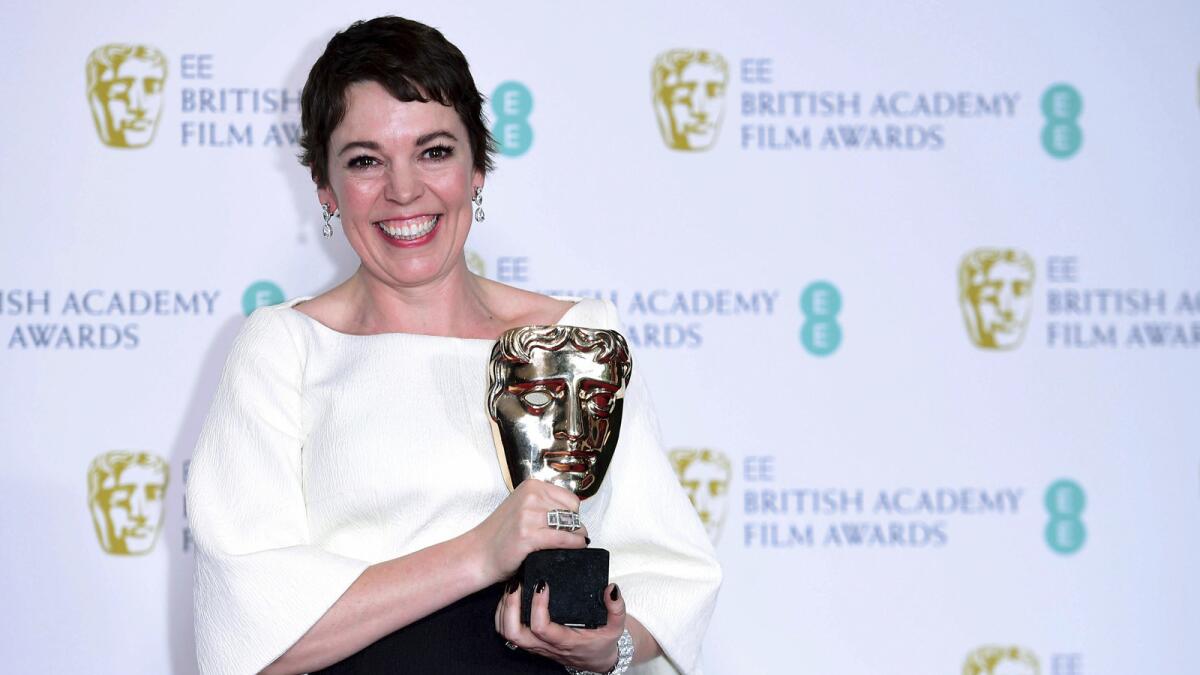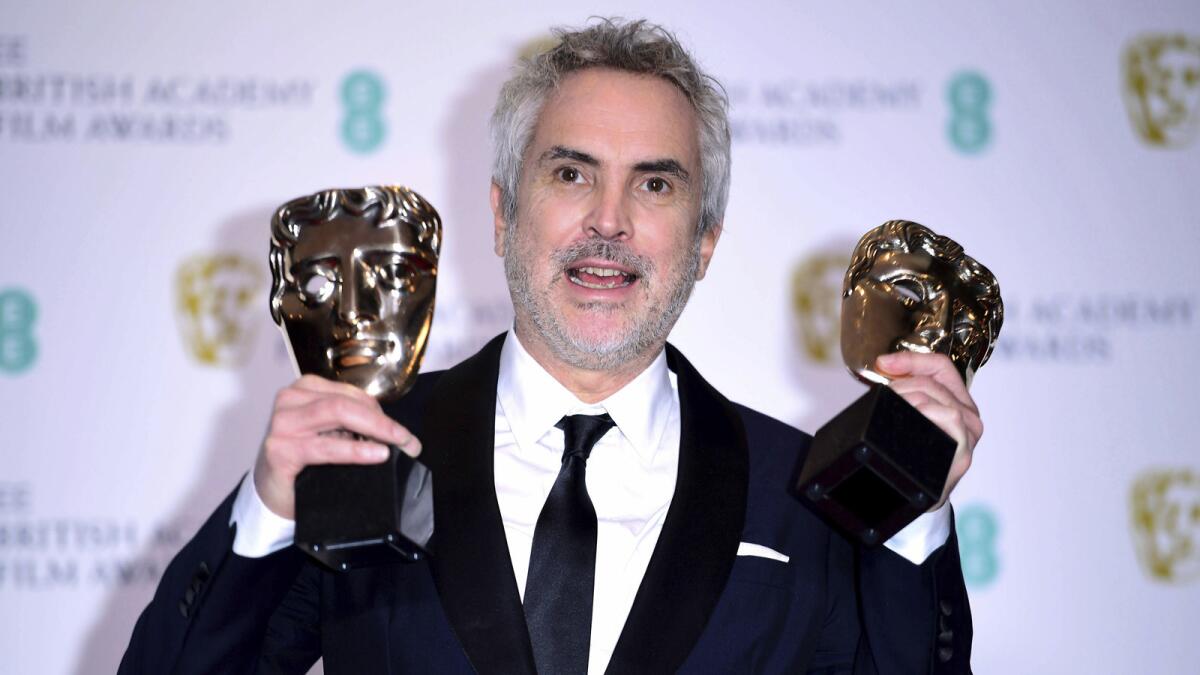2019 BAFTAs: Alfonso Cuarón’s ‘Roma’ and ‘The Favourite’ dominate

Reporting from London — The 72nd annual British Academy Film Awards filled London’s Royal Albert Hall on Sunday evening, offering a further sense of clarity to the upcoming Oscars. Joanna Lumley returned as host for the second year, welcoming the audience and home viewers to “our annual rhapsody in celebration of film brilliance,” and led the three-hour ceremony as “The Favourite” and “Roma” tallied the most victories.
Lumley took the stage after a performance by Cirque du Soleil inspired by “First Man” and the anniversary of the moon landing, a strange choice for a British awards ceremony. “Thank goodness BAFTA has a host,” Lumley deadpanned during her opening monologue. “Although that might be due to the fact that I’m not on Twitter.”
She jovially took aim at several nominees, joking that they’d all braved the English weather in chauffeured limousines. Not all of Lumley’s jests landed well with the audience. Gesturing to “BlacKkKlansman” director Spike Lee, Lumley said of the film, “It should win many awards, although I’m surprised it did so well at the Klan Film Awards.”
2019 BAFTAs: See the full list of winners »
The announcement of the first category, outstanding British film, was an immediate relief for many, confirming a win by “The Favourite” over expected victor “Bohemian Rhapsody.” The latter was the subject of controversy last week when the British Academy of Film and Television Arts announced it was removing director Bryan Singer’s name from the nomination.
Singer, who was fired from the film three weeks before the end of production, is credited as director on “Bohemian Rhapsody” but has been absent from its awards run, including during its surprise win at the Golden Globes for motion picture drama. On Feb. 6, the British academy announced: “In light of recent very serious allegations, BAFTA has informed Bryan Singer that his nomination for ‘Bohemian Rhapsody’ has been suspended, effective immediately. BAFTA considers the alleged behaviour completely unacceptable and incompatible with its values.” Singer did not attend the BAFTA Awards and was similarly absent from leading actor winner Rami Malek’s speech. Malek, who called his win “truly extraordinary,” did express his gratitude to Dexter Fletcher, who stepped in for Singer but is not a credited director on the film.
“The Favourite” took the hometown advantage in several categories, including supporting actress for Rachel Weisz, original screenplay, costume design, and makeup and hair. Director Yorgos Lanthimos accepted the BAFTA on behalf of “The Favourite,” nominated in 12 categories, with a terse speech, noting “This film took 20 years to make. I contributed to the last 10.”
Olivia Colman received a standing ovation as her name was called for leading actress for her portrayal of Queen Anne in “The Favourite.” Struggling to read several pages of tiny notes, Colman exclaimed, “We’re having an amazing night, aren’t we?” She added of co-stars Weisz and Emma Stone: “This is for the lead, and as far as I’m concerned the three of us are the same and should be the lead, and it’s weird that we can’t do that. But this is for all of us. It has my name on it, but we can scratch in some other names.”

Alfonso Cuarón, nominated in six categories for “Roma,” kept his speeches short as he won for best film, cinematography, film not in the English language and director. These awards substantiate the Netflix film’s potential at the Oscars, making it a strong contender for best picture as well as best director.
“Foreign is just a different color,” the Mexican director said. “And colors complement each other. The specific color of this film is Mexico.” The director, clearly overwhelmed, added, “I’m really, seriously touched this film has been received the way it’s been received. I have so many people to thank. I think I will go into tears now.”
Cuarón brought his cast and crew onstage as the film was awarded best film. “To see a film about an indigenous domestic worker embraced this way in an age when fear and anger propose to divide us means the world to me,” Cuarón said. “Reverting back to a world of separation and isolation is not a solution to anything. It’s simply an excuse to hide our fear within our basest instincts. Whether we like it or not, we are all connected, sharing a space and time. And when we finally choose to embrace that connection and show compassion for one another we embrace together. I truly believe that cinema has the power to help us achieve that.”
“A Star Is Born” fared less well but did take the original music category, setting the stage for a potential win at the Oscars for the song “Shallow.” Lady Gaga was in L.A. for the Grammys, but director Bradley Cooper, who won the award alongside songwriters Gaga and Lukas Nelson, was on hand. “I got to fulfill a dream I never thought would happen,” he said. “and I got to do it with some of the best musicians in the world.” The actor, who called music “the heartbeat” of the film, also thanked his girlfriend, Irina Shayk, for letting him rehearse endlessly in their basement.
Other winners included “Spider-Man: Into the Spider-Verse” for animated film, Mahershala Ali for supporting actor for “Green Book” and “Free Solo” for documentary. “BlacKkKlansman’s” Lee accepted the award for adapted screenplay, thanking a lengthy list of names including producers Jordan Peele and Jason Blum. As he left the stage, Lee shouted, “Brooklyn is in the house!”
“Black Panther,” nominated for best picture at the Oscars, was represented in two categories, winning for special visual effects while star Letitia Wright won the 2019 EE Rising Star Award, which is voted on by the public. Although Wright didn’t reference the film in her speech, she did acknowledge her recent growth as an actress. “This wasn’t an overnight thing,” she said. “It wasn’t a click of the finger. It’s still a work in progress.”
Producers Elizabeth Karlsen and Stephen Woolley, co-founders of Number 9 Films, which produced Keira Knightly’s recent film “Colette,” received the award for outstanding British contribution to cinema. Oscar-winning editor Thelma Schoonmaker, best known for “Goodfellas” and “Raging Bull,” was honored with the BAFTA fellowship, presented by the Duke of Cambridge, who has been president of BAFTA since 2010.
Brexit was an undercurrent of the evening as the U.K. prepares to leave the European Union in March. Dame Pippa Harris, BAFTA chair, made light of the anxiety surrounding Brexit during her off-camera opening remarks. “These are of course turbulent and confusing times,” Harris said. “But especially in an industry where Brexit will be adding 45 minutes to the length of the latest Bond movie as Daniel Craig fumbles with his passport each time he tries to enter a glamorous European location.”
Harris also discussed the BAFTA Film Awards’ new diversity measures, which were implemented last summer for this year’s nominees. The new set of rules and guidelines includes new eligibility requirements for two categories: outstanding British film and outstanding debut by a British writer, director or producer (awarded to writer/director Michael Pearce and producer Lauren Dark for “Beast”), marking the first year nominees in both categories were required to demonstrate meeting at least two of the four BFI diversity standards. That framework, set up by the British Film Institute for measuring inclusion and representation, marks four major goals: on-screen representation, representation in leadership, industry access and audience diversity.
“This is the first time we’ve made these standards a requirement of entry, and your response has been overwhelming and positive,” Harris said. “We feel equally strongly that everyone has the right to work in a safe professional environment free from harassment bullying of any kind. Looking to the future, it’s clear that there is still much more to be done before our industry and these awards truly reflect the wonderful diversity of our society, at a time when across the world people are seeking to divide us and set us against one another, film has a unique role to play. Wouldn’t it be great if as our legacy we could leave a robust, diverse industry open to anyone regardless of background, which supports everyone in telling stories that matter to them?”
More to Read
Only good movies
Get the Indie Focus newsletter, Mark Olsen's weekly guide to the world of cinema.
You may occasionally receive promotional content from the Los Angeles Times.









